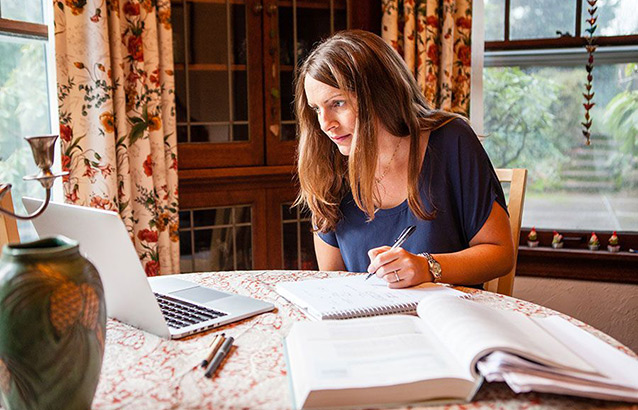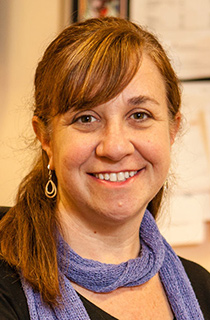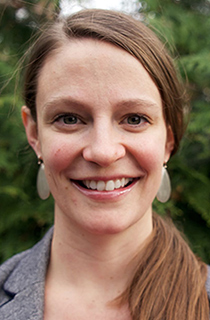Online learning opportunities offer quality and flexibility to Oregon State Ecampus students

Kathleen Garney, a student in the Ecampus MBA in Executive Leadership hybrid program, is able to juggle coursework at home while working full time as a Boeing Company manager in Portland. (Photos by Oregon Business)
E-tutorials, open courses and online labs are all the rage these days, but Oregon State University has been educating the distant masses since videotape was king.
Back in the ’80s, lessons were delivered to distance-degree students via correspondence and VHS. Today, the world’s gone online, and OSU enrolls nearly 18,000 students in 50 states and 40 countries through Oregon State Ecampus.
Ecampus partners directly with university departments and colleges to deliver 43 undergraduate and graduate degree programs online and nearly 1,000 courses in 90 subjects. And the breadth of OSU’s online offerings is proving valuable to professionals — and employers — in the Pacific Northwest and beyond.

Lisa L. Templeton, executive director of OSU Extended Campus
It’s a brave new world for higher education, but going online need not entail sacrificing quality. U.S. News & World Report ranks Ecampus among the nation’s 10 best providers of online bachelor’s degree programs, and providing an exceptional education to a diverse population of adult learners is the primary objective, says OSU Executive Director of Extended Campus Lisa L. Templeton.
“It’s a competitive marketplace, so we’re really focused on quality: quality courses, quality instruction and quality student support services,” she says.
OSU Ecampus learners include mid-career professionals and stay-at-home parents as well as traditional students who prefer the flexibility of online learning, says Templeton: “Providing degrees online so people won’t have to pick up and move their life to Corvallis helps us serve a wider range of students.”
As courses are developed and administered, the OSU Ecampus team assists in a variety of ways. Through an engaging partnership with more than 600 OSU faculty members, the classes are designed to meet desired learning outcomes and industry best practices.
Last fall Ecampus added three new business programs to accompany its MBA in executive leadership track, popular with professionals looking to up their game without uprooting their lives.
That model fit the bill for Kathleen Garney, a current MBA student and full-time Boeing Company manager in Portland.
“My career wasn’t stalled, but I wanted to turbocharge it,” she says. “When I realized an in-person MBA was not in the deck of cards for me, I started looking at online opportunities.”
“We have diverse learners and want to meet all learning goals and styles. … The future is providing more options, including partially or fully online programs, so learners can choose what works best for them.”
Ecampus empowered Garney to learn on her own terms. The MBA track delivers instruction in a hybrid format — 80 percent online and 20 via in-person classes in Portland.
“I had the flexibility to adjust the time I spent on school based on my work schedule,” Garney says.
In addition to the Executive Leadership MBA, Ecampus also delivers a hybrid MBA and graduate certificate in business analytics, plus a bachelor’s degree in business administration that is 100% online.

Chauncy Faulkner, Ecampus computer science student
No matter the discipline, Ecampus is focused on delivering programs that provide career advancement opportunities. Students holding a completed undergraduate degree can earn a postbaccalaureate degree in computer science online through Ecampus, and this appealed to 2013 graduate Chauncy Faulkner.
“I chose Ecampus for three reasons,” she says. “One: I wanted a computer science degree. Two: I didn’t want to have to move. And three: I didn’t want to have to start from scratch.”
Faulkner, now a software engineer at Seattle-based Slalom Consulting, loved the virtual setup: “I didn’t have to trek across campus for office hours and wait in line outside somebody’s office. And it was easy for me to post in discussion boards, whereas in a classroom I might not have raised my hand or spoken up.”
In the classrooms of the future, will all learning be delivered online? Unlikely, says Templeton; online learning aims to complement rather than replace traditional learning environments.
“We have diverse learners and want to meet all learning goals and styles,” she says. “Many people thrive in online courses, and for some, it may not be their preference. But for adult learners juggling multiple life responsibilities, online learning can be a great fit. The future is providing more options, including partially or fully online programs, so learners can choose what works best for them.”

